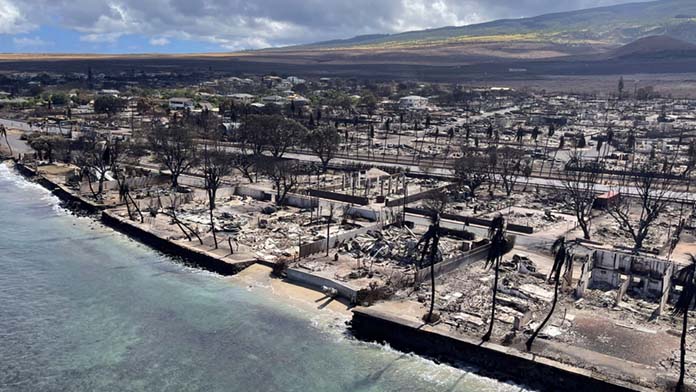Heatwaves and wildfires have been raging across the northern hemisphere. July was the hottest month ever recorded. Europe, South East Asia, northern Africa and the United States have all experienced devastating, prolonged and intense heat.
In some parts of California temperatures stayed above 40 degrees for over a month. In Southern Europe temperatures reached up to 48 degrees, in China up to 52.2. Records have been shattered.
The heat has fuelled fires in at least ten countries, including Greece, Canada and Algeria.
Hawaii has experienced the deadliest fires in its history, with over 100 people confirmed dead and the toll expected to rise, after a “fire hurricane” ripped through the resort town of Lahaina. Apocalyptic destruction has left at least 4500 people homeless.
This is the climate crisis. Australian climate scientist Dr Perkins-Kikpatrick told ABC news that these heatwaves “wouldn’t have lasted as long, or been as intense [without] climate change.” Terrifyingly, this has come at the beginning of the El Nino cycle, which will produce extreme heat and dry conditions during Australia’s summer.
The crisis has exposed the failure of capitalism to prevent global heating or to prepare for the effects of climate change.
Decades of neoliberal cuts to public services have left emergency responses unprepared. The president of the Hawaii Firefighters Association told CBS news that crews in Maui have only 65 firefighters to respond across three islands, and only a dozen trucks which are limited to city roads.
Greece has enlisted the support of several European countries to help battle fires that are out of control. In many places, residents have been entirely abandoned, forced to take on the responsibility of battling the fires and organising evacuations themselves.
Elements of the response have been reminiscent of the authoritarian approach governments took to the COVID pandemic. The Mayor of Athens announced that public parks would be closed due to the heat, yet construction workers were forced to work despite government advice to stay at home. The army and police have been mobilised to fight fires, but hospitals and emergency services have not received the funding they need.
Climate and class
We are seeing clearly that the climate crisis does not affect everyone equally, but is playing out along class lines. Workers and the poor suffer the most.
Extreme heat has punishing effects on health, particularly for those already vulnerable. Last summer’s heat in Europe killed 61,000 people, with the toll this year sure to be far higher. The US is set to reach a record number of heat related deaths this year due to the heatwaves, and hospitalisations and heat related deaths have already spiked across Europe. Workers, particularly those in physical and outdoor jobs, face danger and death by continuing to work.
Workers have died on the job from the heat. In Italy, five people died in a week, including a cleaner, two construction workers, a road worker and a baker, due to heat stress suffered at work.
As a result, factory workers and labourers across Italy threatened to strike in July, calling for furloughs as temperatures became too intense to work in.
Workers at two McDonald’s stores in southern Italy called a strike after the company tried to replace broken air-conditioners with portable air coolers. Several workers in the kitchen area had fallen sick due to the heat.
At a battery factory in Sulmona, workers threatened to strike for eight hours, with the union arguing “asphyxiating heat is putting the lives of workers at risk”.
In Athens, tourism workers at the Acropolis stopped work for four hours a day due to the unbearable heat.
Workers here will face similar issues as bosses put profits above health. During the 2019 bushfires, wharfies at Port Botany and construction workers on road projects in Sydney stopped work, refusing to suffer the toxic smoke.
Workers in the US faced similar issues in June due to smoke from fires across North America.
The local union branch for delivery drivers in New York’s Brooklyn and Queens was forced to buy N95 masks themselves to distribute to drivers after the company did nothing. One worker was taken to the emergency department after working for half a day in toxic smoke.
The devastation we are seeing is the result of a planet which has warmed by 1.2 degrees above pre-industrial levels. With current policies in place we are projected to reach a catastrophic 2.7 degrees of warming. And warming is happening much faster than predicted.
It is an outrage that while so much of the world burns and suffocates in heat and smoke, our government is still expanding fossil fuel projects. We need to organise now to fight the climate crisis, and the escalating effects as it unfolds.
By Cooper Forsyth






